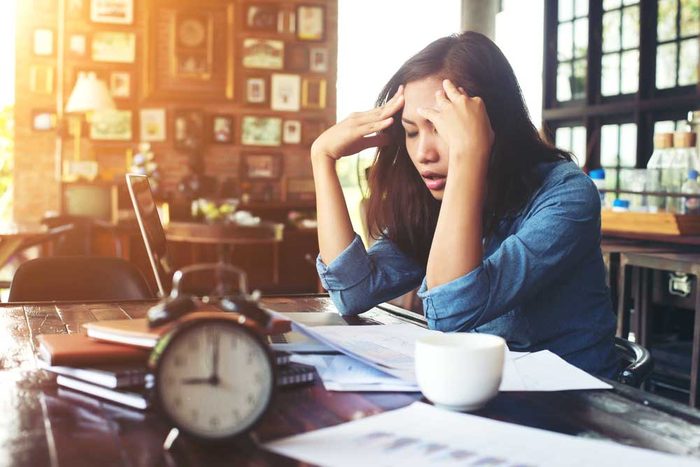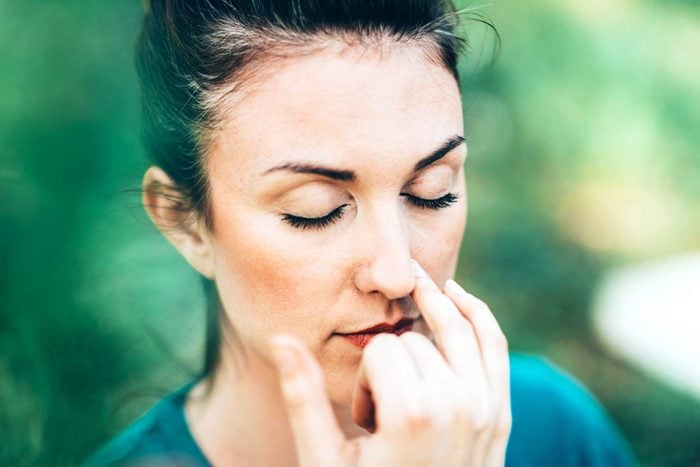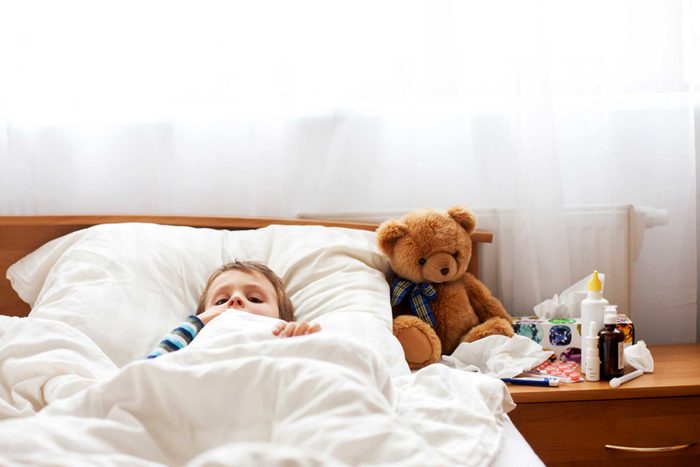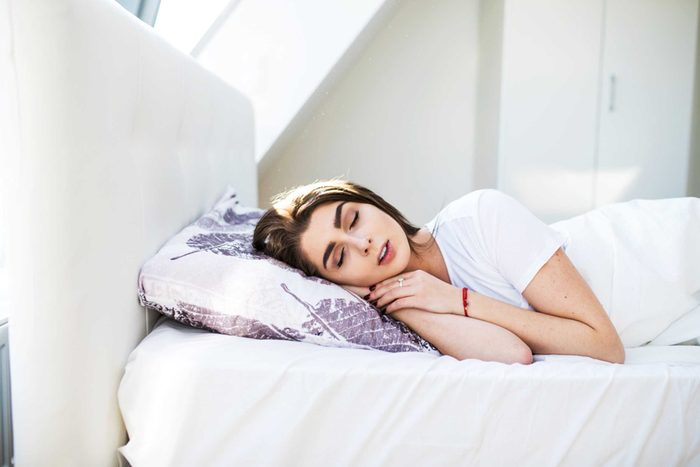People who have panic attacks (feelings of intense fear that can be a sign of a type of anxiety disorder called panic disorder), often feel like they are having an urgent health crisis because the symptoms can be so sudden and severe. According to the National Institute of Mental Health, anxiety disorders are the most common mental illness in the United States, affecting 40 million adults (18 percent of the population).
“Symptoms of anxiety disorder range around mood, cognitive, and physical symptoms,” explains Joel Sherrill, PhD, deputy director of the Division of Services and Intervention Research at the National Institute of Mental Health. The long list of symptoms includes everything from feelings of restlessness or having difficulty concentrating, to muscle tension, fatigue, and sleep problems. While people who have anxiety or panic attacks often experience symptoms for months, they don’t always realize that they have anxiety.
“They seek treatment because they can’t sleep or they get a massage or go to the doctor because they can’t relax,” says Karen Cassiday, PhD, ACT, president of the Anxiety and Depression Association of America. “Worry itself seems like the right thing to do so they don’t seek help for the worry,” says Dr. Cassiday. “With panic, you have unexpected, sudden attacks of intense fear,” says Dr. Sherrill. “You feel out of control, like you are going to die, and the physical symptoms—tightness of chest, difficulty breathing—can be alarming.” (Here are some weird things that might be making you anxious.)

First, rule out other possibilities
Other physical conditions, as well as the side effects of certain medications, can mimic the symptoms of an anxiety attack and panic disorder. “Anyone who is experiencing symptoms that are intense or overwhelming, especially if they are new, should seek medical advice to make sure they rule out physical cause,” says Dr. Sherrill. Conditions such as low blood sugar, an overactive thyroid gland, hormonal imbalances, autoimmune disorders, inner ear disorders, and dysfunction of the mitral valve of the heart can mimic anxiety while medications such as codeine, calcium channel blockers, ACE inhibitors, statins, and benzodiazepines can cause anxiety-like symptoms such as agitation, dizziness, flushing, tremors, restlessness, palpitations, and fatigue. “Those who experience a panic attack may think they are having a heart attack,” says Dr. Sherrill. “The first thing to do is make sure they are not.” (Here are the other chest pains you might mistake for a heart attack.)

Recognize that you are not in danger
Anxiety can manifest in many ways, such as general anxiety, social anxiety, phobias, separation anxiety, and panic attacks. According to the Anxiety and Depression Association of America, it’s a normal biological reaction—the body’s way of telling us that something isn’t right—that prepares us to act quickly so we stay out of harm’s way. Yet when anxiety becomes overwhelming and begins to interfere with our daily lives, it becomes an anxiety disorder.
Panic attacks happen out of the blue and overwhelm with physical symptoms of a racing heart, nausea, trembling, and irregular pulse. “It’s traumatic,” says Dr. Cassiday, “Like the feeling that you got as a kid when someone held you under the water too long—you feel like something terrible is happening.” Many people who experience a panic attack believe they are having a heart attack or stroke and misperceive it as being in imminent danger. “They want to get help because it feels unusual, it doesn’t make sense, and they will call their doctor or go to the emergency room,” says Cassiday.
With generalized anxiety disorder (GAD), people experience an attack of worry and experience symptoms of fatigue, restlessness, muscle tension, and sleep problems. “They get caught up in the worst-case scenario and they can’t let go of it—what if I lose my job, what if my partner is having an affair, what if my child gets in a car accident,” says Cassiday. While the symptoms of panic attacks and anxiety attacks can be alarming, the most important thing to realize is that you are not in danger, she explains. “You need to understand that it is a false alarm. Even though you think you are going insane, you are not—most panic attacks will peter out after two or three minutes.” (These are the things only people living with anxiety will understand.)

Breathe quietly and slowly
People who suffer from anxiety and panic attacks often experience chest pains, which are caused by hyperventilating and tight muscles in the chest, explains Cassiday. “They go to the emergency room hyperventilating, holding their chest and belly—they are so tight that they forget to breathe.” While the episode can be scary, it’s important not to tell the person suffering the panic attack to “take a deep breath,” says Cassiday. You don’t want them to hyperventilate. Instead, if you are hyperventilating, breathe calmly. Close your mouth and breathe quietly through your nose, gently, and as slowly as possible to restore carbon dioxide levels—that will make you feel better, says Cassiday. People tend to breathe faster when they are anxious, which can make them lightheaded and dizzy and cause more anxiety. “If you breathe at a rate of six to eight breathes per minute, it cues your body that everything is okay.” Learn what else you can do about chest tightness and anxiety.

Maintain a healthy diet
If you are experiencing anxiety and stress, the average person can help minimize that by eating a balanced diet, says Dr. Sherrill. Enjoying healthy, well-balanced meals, staying hydrated, and limiting alcohol and caffeine are the first steps in helping relieve anxiety through diet. Making sure that you don’t skip meals is also important to avoid a drop in blood sugar, which can cause you to feel jittery and worsen your anxiety. (Here are some more totally natural remedies for anxiety symptoms.)

Exercise regularly
We know that exercise is good for our physical health, but research has also found that low levels of physical activity are associated with anxiety. Researchers have found that exercise such as running activates brain chemicals that can reduce anxiety. “If you are experiencing anxiety and stress, the average person can minimize that by exercising, practicing mindfulness-based movement such as yoga and Tai Chi,” says Dr. Cassiday. Both aerobic and non-aerobic exercise have been linked to better management of anxiety.

Know your triggers
While genetics and upbringing can increase your risk of anxiety, certain triggers can make anxiety reoccur or worsen. Sudden changes in life such as having a baby, being laid off from work, or having a sick child can cause anxiety and excessive worry, explains Dr. Cassiday. “What happens is that the elevated stress at some point becomes overwhelming and it trips the alarm system in the brain and body. It can be imaginary or real and still set off the same stressors.” For those with an anxiety disorder, the trigger can be anything that makes them feel uncertain or like they have less control, such as flying, crowds, or pressure at work, while for those who have panic attacks, the trigger can be any type of perceived physical change. “They may be afraid to exercise or have sex because it will bring on a panic attack—these physical changes trigger their alarm system,” says Dr. Cassiday. Note, too, that panic attacks have happened out of the blue with no trigger at all. (These are the everyday habits that can actually be panic attack triggers.)

Get adequate sleep
Getting enough sleep and making sure you have a sleep routine are important factors in controlling anxiety, says Dr. Sherrill. When your sleep is compromised, it can affect your mood and impair your ability to cope with the stress you do encounter, and that can trigger a vicious cycle, he explains. Studies show that sleep affects the brain and can directly affect your mental health. A 2016 systematic review and meta-analysis on the topic found that acute sleep deprivation is associated with an increase in anxiety. In addition to making you feel more anxious, sleep deprivation creates an imbalance in hormone levels and increases adrenaline levels, and both can increase anxiety. “Not getting enough sleep puts you in a bad mood, impairs coping, and causes stress, which leads to not getting enough sleep,” Dr. Sherrill says. (These are the things about social anxiety disorder psychologists wish you knew.)

Consider cognitive behavioral therapy
Cognitive-behavioral therapy (CBT) is a talk therapy based on the notion that thought patterns lead to problems with feelings and behaviors, and we can manage these problems by changing the way we think and behave. With all fears, regardless of the disorder, learning is critical for recovery and CBT can help people accept that they will get anxious and if they face it enough, it will get better, says Dr. Cassiday. Research shows that CBT is effective in helping people with anxiety, and with CBT, there are two sets of strategies, explains Dr. Sherrill. The cognitive side helps people recognize anxiety generating thought patterns. (For example, when you are socially anxious, you think everyone is looking at you.) “A therapist will help the individual recognize the thoughts and then debunk that thinking,” he says. The behavioral strategy identifies the threatening situation and then the therapist develops a plan that guides the patient through exposure to that situation. “It helps you face the fear of facing your fears.” says Dr. Sherrill. (Here are the signs you should think about seeing a therapist.)

Don’t let it change your life
When someone has frequent anxiety attacks, they may stop doing normal activities because they are trying to assuage their anxiety, explains Dr. Cassiday. “They may stop going to the doctor because they are worried they will find out they cancer, or they won’t go to Orlando because they heard an alligator attacked someone there last year.” People who experience panic attacks may start avoiding certain situations because they fear it will bring on a panic attack. When the anxiety starts to get too intense, or goes on for too long, then it is important to get an evaluation, explains Dr. Sherrill. Finding the right therapist takes research and knowing to ask the right questions. “It’s difficult to identify a therapist,” says Dr. Sherrill. The American Psychological Association offers tips, while the ADAA allows users to search for therapists by zip code and specialty. Before booking an appointment, Sherrill suggests asking them about their approach—what type of strategies or exercises they use. “Find out if you will have to do homework between sessions and ask them about their theoretical orientation to therapy—if you are seeking therapy for your child, ask them if they will involve the parent.” Here’s what you should never say to someone with anxiety.

Consider alternative therapies
Not everyone has access or feels comfortable talking to a therapist, but there are alternatives to the one-on-one experience. Bibliotherapy—targeted reading designed to help ease mental suffering—may work for parents of kids with anxiety or for those experiencing mild anxiety, explains Dr. Sherrill. Other therapies include app-based technology such as AnxietyCoach, Headspace, or Pacifica. “Be a good consumer and do a background check to see if the app has been subjected to testing to prove it works,” says Dr. Sherrill. “You should pick your app the same way you would pick a therapist.” Those who can’t physically get to a therapist can try teletherapy, which allows the patient to work with a therapist through video conferencing. Teletherapy is also a convenient option to look into, Dr. Cassiday says. You can also seek out help from an anxiety support group.

